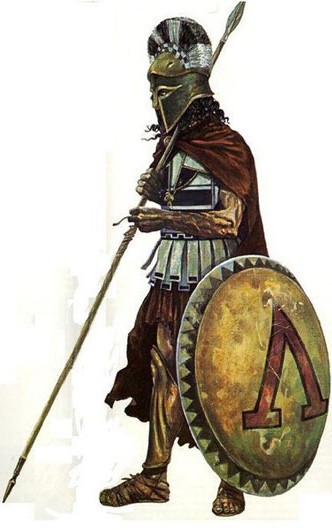By Julia Huse
When it comes to Ancient Greece I am particularly
 Spartan Warrior
Spartan Warriorfond of Athens. As the birthplace of democracy, the epicenter of Greek tragedy, and the intellectual hub of the classical age, Athens had a lot going for it.
Today, however, we look elsewhere. Classical Athens, after all, wasn’t the only place where new and dramatic changes were taking place.
You might be familiar with Sparta, the intensely militaristic city-state of the Ancient world made famous by the movie 300.
Imagine if the United States Marine Corp founded and governed their own country.
That would be Sparta…
Key players in the Greco-Persian War, we often admire Sparta for its toughness and courage. With a focus on its military, however, we hardly ever hear about its government. This is a real shame because Sparta had its own unique political system with two, count them, two kings sitting on the throne at once.
In his Histories, Herodotus explains to us how this dual kingship came about. A Spartan king named Aristodemus had twin sons. Almost immediately after the two boys were born Aristodemus croaked. The Spartans were then faced with a dilemma; who was going to be Aristodemus’ successor? The Spartans wanted to make the older of the twins the new king, as was custom, but the two boys were so “alike and equal” that they could not determine which of the two was the older twin. The Spartans then turned to the mother of the twins, Argeia, who told the Spartans that she couldn’t even tell them apart. This was a lie. She knew which of the two was older but she wanted both her sons to become king.
Better Ask the Oracle
So the Spartans, not sure what to do, did what any good city-state would do at the time: ask the oracle at Delphi.
When they asked the Pythia (for those who don’t know the Pythia was the priestess at the Temple of Apollo in Delphi who gave the oracle), she told the Spartans to make both the boys king. From that point on the Spartans had two kings, one from the lineage of each twin. As the twins grew up they were in constant competition with each other, which then became an important part of the dual kingship.
Power with Limits
These kings were equal in every sense. Both kings dealt equally in the matters of religion, laws and military. Over the years, however, the say that the two kings had in these matters dwindled. By the 5th century BC most of their judicial duties had been handed over to the ephors, a democratically elected group of law makers, and the gerousia, a group of 28 elders elected for life normally part of royal households. Even though their judicial power had been reduced, the kings still held a decent amount of military power.
Either king could lead armies in to war with the approval of certain councils, but it was not permitted for both the kings to lead an army at the same time. One king always had to remain in Sparta in order to prevent anarchy, or the ever-frequent helot (slave) uprising.
A Modern Revival?
The idea of monarchy in Sparta was clearly very complicated. Not only does the “mono” part of monarchy not really apply to their dual kingship, but also the power of these kings were closely regulated and controlled by other councils in their government. This rather odd form of monarchy was somewhat genius in its own way though. Not only did these kings have two councils to check their power, the competition between the two kings kept them in line as well.
The kings held opposing opinions on issues, thus providing a voice for citizens on either side of the issue. Also, making one king always remain in the city ensured order and calm for the Spartans even in times of war. The nature of the two councils also had added benefits. The relative permanence of the gerousia provided stability in their government while the annually elected ephors allowed the Spartans to have a voice in their government.
This whole system seems very similar to the perfect government described by Cicero in his De Re Publica with its mixture of monarchy, aristocracy and democracy. Have we been so distracted by democratic Athens that we’ve missed the odd genius of the Spartan political system?
Now, I’m not calling for a modern revival. I’m not saying that the United States, just as an example, should elect two presidents. Put Hillary AND The Donald in office; let them sort it out amongst themselves.
Yeah…that would work.
But for the ancient Spartans, it DID work, for a while at least.
The next time you think of Sparta, put out of your mind the image of behemoth warriors in leather speedos. Instead, perhaps remember the ancient Spartans as innovative, dare we even say revolutionary, political thinkers.









No comments
Trackbacks
Our apologies, you must be logged in to post a comment.